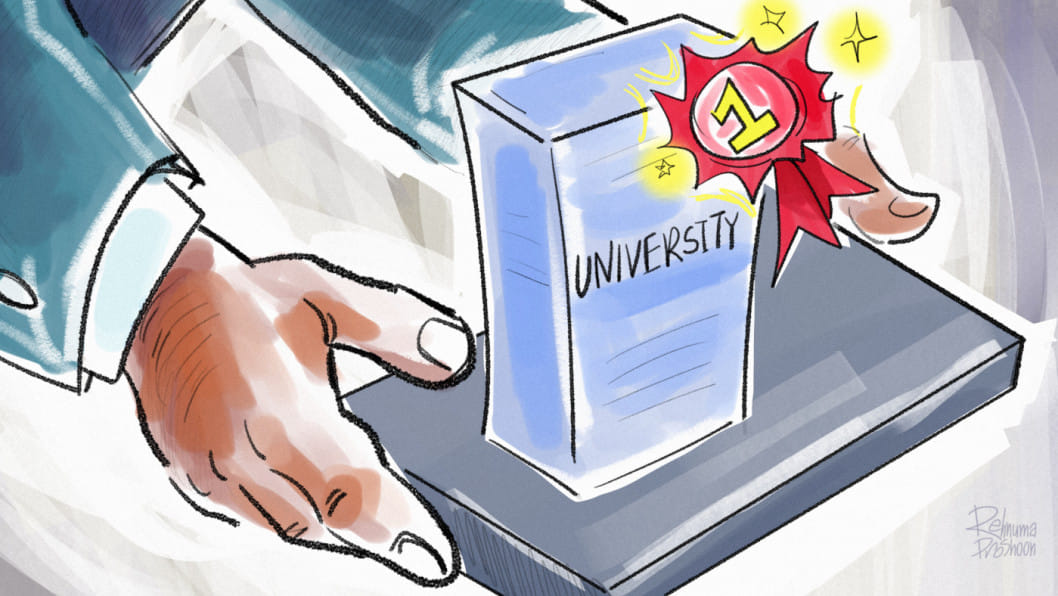What is a good university administration?

Two academics explore what it takes to run a university efficiently and effectively in the sixth part of a series that focuses on some of the most fundamental issues of higher education in Bangladesh. The Daily Star welcomes and encourages any and all thoughts, ideas, and recommendations on these issues from our respected readers.

Administrators and managers of many organisations consistently receive the poorest grades in public opinion polls based on people's experiences of dealing with them – officials who are responsible for organising, managing, and delivering services. This includes administrators of government institutions and industries, businesses, financial institutions, public services, etc, including, of course, the administrators of our educational institutions. To be sure, there have always been exceptions. For example, just recently I experienced the most positive transformation of attitude among the officials of the government's agriculture department, especially those who work with farmers and ordinary folks in the villages and provincial cities. It is as though a magician somehow turned these folks into kind, generous and extremely helpful officials – something that was an anomaly in the earlier years. For the most part though, people's experience of dealing with other administrators has been, since the inception of this nation, abysmal, to put it mildly.
In fact, this society has decided that many of the administrators are arrogant, unhelpful, often abusive, generally unethical, frequently self-serving, and almost invariably corrupt – to mention just a few of their attributes. They have been the bane of people's service experiences, but I won't belabour the issue except to underscore a few additional issues about the management and administration of the higher educational institutions in Bangladesh.
Efficient and effective management of a university's major resources – its finances, faculty members, administrative staff, its labs, libraries, museums, etc, and most importantly, smart stewardship of its academic and research programmes to achieve the institution's missions and vision – is typically considered the major roles of the administrators; when done well, it's considered "good/great university administration." But this is the ideal scenario. What's happening at our public and private universities is often shocking!
Some of the key standards of good university administration are transparency, accountability, quality of education, innovation and research, safe learning environment, etc. However, transparency isn't the strongest suit of our administrators. Almost all universities have been accused of lack of transparency, nepotism, financial mismanagement, etc. Of course, this problem is pervasive from among the highest levels of the government to the lowest; anyone who has some authority benefits, first of all, himself/herself, and next, someone who is a relative, friend, colleague, etc. At our universities, the lack of transparency, nepotism, etc takes the form of appointing, sometimes, utterly unqualified family members and friends to the various management bodies of these institutions.
With almost no accountability, these administrators treat the university like a fiefdom. The chairperson of the governing body, for example, is typically the one who has to approve literally almost everything – from the appointment of faculty to promotion decisions, policy approvals, from budget approval to the signing of contracts for purchasing goods and services. Naturally, self-indulgent "dictators" are born for everyone to bow before with false admiration and boundless adulation – if not publicly, then in private. These folks typically appear more interested in generating revenue for the university than trying to improve the quality of education.
Are these administrators so bad at their work? Not at all. In fact, they are extremely good at making money and generating resources, exercising power and authority, and do what they wish and how they wish to do it.
Here's a story I heard recently from a friend: at the turn of the century, a number of engineers, city designers, architects and academics in the US decided to come together and design a solution to the traffic problem in Dhaka, then take it to the appropriate government officials and show them how the problem could be solved. They took a trip (spending their own money) to Dhaka and set up a meeting with an official.
This senior bureaucrat patiently listened as the team explained their design, smiled knowingly, took them to an adjacent room, pointed towards the stacks of files piled up high on the tables and on the floor and said, "Each one of these is a proposal like yours. They have been sent to us by people like you from abroad. I can pick up any one of these randomly, implement its design and in six months to a year, the traffic congestion in Dhaka will disappear!" He paused. "But we don't do it. Because this problem exists, money flows endlessly to the powerful people – people who run this country. Tell me, why would I try to solve the problem that brings so much good to those who decide the fate of this nation?"
One simple reason explains how these bureaucrats get away with this: they are able to function with impunity, without accountability. These bureaucrats either serve their own selfish interests or they serve other, more powerful ones who provide them such impunity. The appointments of unqualified administrators arise from the need to ensure the security interest of the major stakeholders. The government regulations are far too weak, inefficient, and/or the government officials who are responsible for upholding the "standards" are themselves corrupt.
The top managements of the academic institutions, for the most part, are businesspeople – often also "owners" – and they look at education as another opportunity to make money. Some put another feather on their lapel but they rarely think or spend any time for the improvement of education in general. That's why they can be rude to the students, indifferent to the plights of the faculty and staff, dismissive of government regulations, and overall, be least affected by even the most scathing criticisms that frequently appear in the media. They just couldn't care less! Why? Because in a country with an overflowing population, uneducated and uninformed citizenry, and where the majority of its people are eager to leave forever on any given day, you can feed them just about anything and they'll happily swallow it.
To answer "What's the solution?" one thing is clear: we need a major transformation of our value system. We need to create a generation of citizens who are willing to give back more than they take, to serve the nation than to serve themselves, to live in this country than to flee. We need a new generation willing and capable of creating an egalitarian society, a healthy environment and a place that they can be proud of. With the current generation of administrators whose values have been shaped by self-interest, it'll be hard to create a "smart" society, let alone a happy and just one.
Dr Halimur R Khan is a university professor and can be reached at [email protected].
***

Academic administration takes place at many levels. The more one ascends the decision-making hierarchy, the stronger are the currents and conflicts of interests s/he confronts. Being able to effectively mediate, moderate, and resolve such conflicts that arise both within and external to the university, while remaining steadfast to the institution's purpose, defines, in my mind, the quality and capacity of a capable administrator.
Here I focus on the vice-chancellor: working with a vision and mission to align stakeholders and strategically position her/his university, the VC must strive to showcase how the institution benefits its larger stakeholder community, not just students. Because universities are embedded in society, the gifted administrator finds purpose and fuels passion within the university to ultimately serve society and its knowledge needs.
Altbach and Salmi (2011) identify three complementary sets of factors that operationalise and drive purpose and passion: a high concentration of talent (faculty members and students); abundant resources to offer a rich learning environment and to conduct advanced research; and favourable governance features that encourage leadership, strategic vision, innovation, and flexibility to enable decision-making without being encumbered by [external] bureaucracy.
The adept top administrator must successfully bring together these three elements to forge the character and ethos of the university while dealing with a continuing stream of demands from various stakeholders, often diplomatically, but sometimes with firmness and courage.
In my experience of administering a top-ranked private university in Bangladesh, I would say that an administrator's success lies in her/his ability to deal with the political-economy climate of the institution involving both internal and external actors and influence agents.
Internally, it is vital to build quality programmes, increase enrolments, nurture professional development, invigorate the curriculum, improve general – foundational – education, strengthen research, build needed facilities, etc. Such initiatives can meet strong headwinds from within. To tackle such challenges the VC needs a management team that supports enlightened and decisive leadership, ensures transparent information flows and accountability, monitors performance, rewards good performers, and builds a unique and positive narrative about the university.
The prudent VC is a listener, a deal-maker, a peacekeeper, and a changemaker engaged in negotiation and adaptation. S/he must often accommodate many (some unjustified) requests and directives from the top. Imagine a VC being called by a UGC member to promote a faculty member who did not meet basic promotion criteria. Sadly, such criteria are often ambiguous or decidedly weak and routinely taken advantage of by shrewd and caustic stakeholders, especially when the VC is faint-hearted or driven by self-interest.
The VCs also face a decision-making environment that is highly centralised in our culture, where power is wielded by an individual or a small coterie, especially located in the board for private universities or the ministry (i.e. bureaucrats) in the case of public universities. In this environment, a VC is deemed "able" by the board often by the amount of resources (money) s/he generates (say, through enrolment growth). Public university VCs are deemed able, according to the cognoscenti, by the political clout they can maintain through student coteries and selective recruitment of faculty and administrators. Such priorities often cast student/faculty calibre and quality education to the wind, while failing to fulfil the institution's larger mission – that of educating, enabling and empowering multiple stakeholders.
External actors, too, exert disproportionate influence over the universities, often pushing misplaced agendas. They are merciless and unsparing in their use of power, hierarchy, and proclivity to assert their views. What incapacitates a VC are the priorities of the central planning body (where education still gets the short shrift in budgetary allocations of two percent of GDP – lowest in South Asia); incompetence of the implementing body (especially, bureaucrats in the ministry) which allocates resources without accountability; a weak regulatory body (e.g. the University Grants Commission) that poorly monitors and regulates the universities, and other entities (Accreditation Council, Pharmacy Council, media, etc), each getting in the way of university affairs with agendas of their own. Building alliances with industry, generating collaborations among scholars (local and global), tapping into the diaspora, and engaging the alumni – all involve negotiating and making compromises that are not always optimal and often conflict-prone.
In a milieu of competing interests, the good administrator is comparable to the conductor of a symphony orchestra. The better s/he is able to harmonise a large ensemble of actors with their array of agendas, the more likely s/he will be to take her/his university to greater heights.
Competent VCs must also confront and manage change. For example, New Public Management (NPM) reforms, globally, are strongly driving quality assurance, audit and accountability mechanisms today. This is also coming to Bangladesh. According to Krucken, Engwall, and Decorte (2018, p. S1), NPM is challenging university governance to:
* Deliver "targeted results" in return for state resources based on concrete performance indicators;
* Manage demands of other external bodies (accreditation agencies, governance boards and the media); and
* Transform themselves "by becoming integrated, goal-oriented, and competitive entities wherein management and leadership play an ever important role."
It is pertinent to observe that some VCs have not lived up to their image and responsibilities, berated with charges of corruption, nepotism, incompetence and the like. Well-intentioned VCs are beleaguered today, struggling with rising demands of multiple stakeholders, poorly trained management/support staff, lack of resources, infighting among competing groups, the backbiters, and a grim facilitating environment; an entire day can be spent sitting in traffic or in a power wielder's office to answer a call or maintain a relationship! Some VCs are unduly rebuked and humiliated by the powers that be. But they (the VCs) fail to take a stand or speak out in their own defence; keeping the job is perhaps more important!
Two significant challenges regarding top administration that demand open discussion are: 1) how to limit the dictates of the BoT (for private universities) or the political/bureaucratic overlords (for public universities) who unduly micromanage the operations of the universities. The harm they cause to education is considerable; and 2) what clear mandate must the VCs be given in their terms of reference? Otherwise, in the nebulous operational frame of the university, while running the institution smoothly, it is always easy to pick on something innocuous to make the VCs' life miserable. A third question demanding introspection is, "Who really controls our education system?" Why did it rank 112th out of 138 countries in the Global Knowledge Index 2020? Why such neglect?
To get the best out of our VCs, it is important to negotiate measurable (SMART) goals, then allow the VC and her/his team to achieve them. The board/syndicate meetings will provide ample scope to deliberate on the VC's skills and performance; daily monitoring and needling or harassment is unnecessary.
Also, when a university wants a VC, it must have government approval. Why? Why not allow the academic ecosystem to become adept at choosing its own leader? In my experiences overseas, I have seen faculty governance and the VC (President) working together and building synergy and great universities! An "unencumbered" governance mechanism with "genuine" autonomy would enable the VC and faculty governance to make the universities sparkle. Perhaps that mechanism now deserves a chance. In the event of poor performance or failure (by way of the VCs terms/mandate), the removal process should also be fair and prompt. Four years (or some fraction) is too long to allow incompetence to continue in the university leadership setting.
Dr Syed Saad Andaleeb is distinguished professor emeritus at Pennsylvania State University in the US, former faculty member of the IBA, Dhaka University, and former vice-chancellor of Brac University.


 For all latest news, follow The Daily Star's Google News channel.
For all latest news, follow The Daily Star's Google News channel. 












Comments